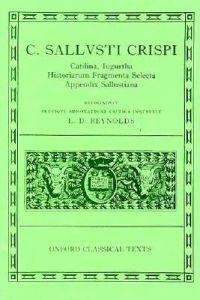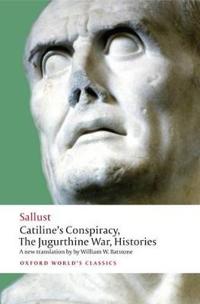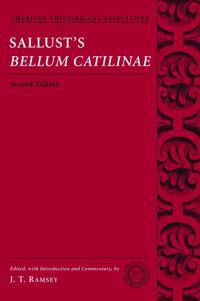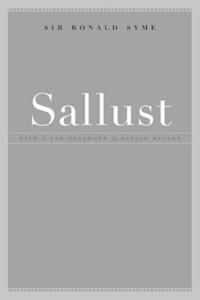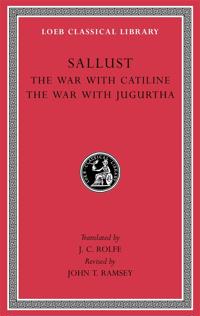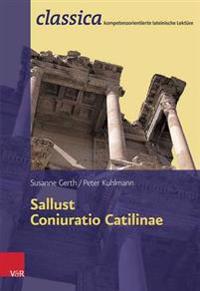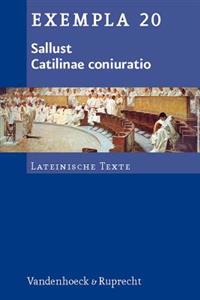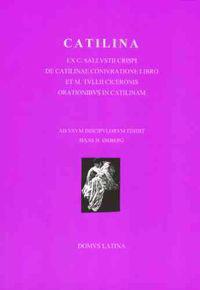Sallust Catilina, Iugurtha, Historiarum Fragmenta Selecta, Appendix Sallustiana (Inbunden)
avSallust
ISBN: 9780198146674 - UTGIVEN: 1991-05This new edition of Sallust, the first critical text for over thirty years, is based on a fresh study and collation of the manuscripts, as well as careful consideration of the indirect tradition. Besides the well-known Catiline and Jugurtha, the volume contains more than seventy of the longer or mor[...]
Sallust: Bellum Catilinae (Pocket)
avSallust, McGushin, P
ISBN: 9780906515198This is Sallust's text, "Bellum Catilinae," in Latin with English introduction and notes.
The Works of Sallust. Translated Into English by Thomas Gordon, Esq. (Häftad)
avSallust
ISBN: 9781140958635 - UTGIVEN: 2010-05Catiline's Conspiracy, the Jugurthine War, Histories (Häftad)
avSallust
ISBN: 9780192823458 - UTGIVEN: 201004'the glory of wealth and physical beauty is fluid and fragile; but virtue is held brilliant and eternal' The Roman historian Sallust lived through troubled times. He deplored the moral and political decline of the Republic, and in his two monographs he set out to exemplify the reasons for the years [...]
Sallust's Bellum Catilinae
ISBN: 9780195320855 - UTGIVEN: 2007-01In his Bellum Catilinae, C. Sallustius Crispus or Sallust (86-35/34 B.C.E.) recounts the dramatic events of the year 63 B.C.E. when a disgruntled and impoverished nobleman, L. Sergius Catilina, after two electoral defeats, made himself the leader of a group of heavily indebted young aristocrats and [...]
Histories: Volume 2 (Books III-V), The (Inbunden)
avSallust
ISBN: 9780198721437 - UTGIVEN: 1994-01-20Sallust (Häftad)
avRonald Syme
ISBN: 9780520234796 - UTGIVEN: 200206With this classic book, Sir Ronald Syme became the first historian of the twentieth century to place Sallust - whom Tacitus called the most brilliant Roman historian - in his social, political, and literary context. Scholars had considered Sallust to be a mere political hack or pamphleteer, but Syme[...]
The War With Catiline/ The War With Jugurtha (Inbunden)
avSallust, J. C. (TRN) Rolfe, John T. (EDT) Ramsey
ISBN: 9780674996847 - UTGIVEN: 2013-11Sallust, Gaius Sallustius Crispus (86-35 BCE), a Sabine from Amiternum, acted against Cicero and Milo as tribune in 52, joined Caesar after being expelled from the Senate in 50, was restored to the Senate by Caesar and took part in his African campaign as praetor in 46, and was then appointed govern[...]
Sallust (Pocket)
avMichael Comber, Catalina Balmaceda, Michael Comber
ISBN: 9780856686382 - UTGIVEN: 2009-02Sallust (Pocket)
avJ. R. (EDT) Hawthorn
ISBN: 9781853997181 - UTGIVEN: 2008-09This selection of passages from "Sallust's Bellum Iugurthinum", reissued now after many years out of print, consists of the following chapters: V-VI, XII-XIII, XV-XVI, XX-XXVI, XXVII-XXXI, XXXIX-XLI, XLIII-LV, LXIII-LXIV, LXXIII, LXXX-XCII.4, XCV-CII.4, CXI-CXIV. These are arranged in three main nar[...]
Sallust, Coniuratio Catilinae (häftad)
ISBN: 9783525710968 - UTGIVEN: 2014-09Sallust berichtet in seiner Schrift coniuratio Catilinae nicht nur uber die Person des Catilina und den Ablauf der Verschworung. Vielmehr geht es ihm auch um eine Deutung der romischen Geschichte: Eine idealisierte Anfangsphase wird dem spateren Verfall gegenubergestellt. Die kritische Reflexion die[...]
Sallust, Catilinae Coniuratio
ISBN: 9783525716236 - UTGIVEN: 2009-07Die Ausgabe präsentiert den Text in optisch fassbarer Form und legt auf folgende Dinge besonderen Wert: Die Komposition des Werkes und die inhaltlichen Verbindungen und semantischen Bezüge der einzelnen Kapitel stehen im Mittelpunkt; herausgearbeitet wird vor allem die anthropologische Betrachtung[...]

